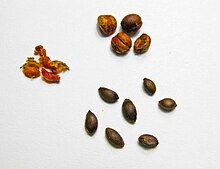Celastrus paniculatus
| Celastrus paniculatus | |
|---|---|

| |
| Fruits | |
| Scientific classification | |
| Kingdom: | Plantae |
| Clade: | Tracheophytes |
| Clade: | Angiosperms |
| Clade: | Eudicots |
| Clade: | Rosids |
| Order: | Celastrales |
| Family: | Celastraceae |
| Genus: | Celastrus |
| Species: | C. paniculatus
|
| Binomial name | |
| Celastrus paniculatus | |
| Synonyms | |
|
Celastrus dependens | |

Celastrus paniculatus is a woody liana commonly known as black oil plant, climbing staff tree, and intellect tree (Sanskrit: jyotishmati[1] ज्योतीष्मती, Hindi: mal-kangani माल-कांगनी, Chinese: deng you teng 灯油藤).[2][3][4] This climbing shrub grows throughout India at elevations up to 1,800 m (5,900 ft).[2][5]
C. paniculatus is a deciduous vine with stems up to 10 cm (3.9 in) in diameter and 6 m (20 ft) long with rough, pale brown exfoliating bark covered densely with small, elongated lenticles. The leaves are simple, broad, and oval, obovate or elliptic in shape, with toothed margins.[2][3]
Traditional medicine
Oil from the seeds is used as a
Poisonous relative
Celastrus paniculatus has a relative that grows in the United States that is poisonous (Celastrus orbiculatus), so identifying this plant carefully can be important.
References
- ^ "Intellect Plant Benefits And Uses: 4 Ayurvedic Benefits And Harm Of Jyotishmati". 2022-02-15. Retrieved 2022-02-16.
- ^ ISBN 978-0-7890-1768-0.
- ^ ISBN 978-81-7041-177-2.
- ISBN 978-0-521-39250-1.
- ^ Zhixiang Zhang, Michele Funston: Celastrus, in Flora of China, Vol. 11
- ISBN 978-81-85086-80-4.
External links
- Caldecott, Todd (2006). Ayurveda: The Divine Science of Life. Elsevier/Mosby. ISBN 978-0-7234-3410-8. Contains a detailed monograph on Celastrus paniculatus (Jyotishmati) as well as a discussion of health benefits and usage in clinical practice.
- Bhanumathy, M.; Harish, M. S.; Shivaprasad, H. N.; Sushma, G. (Mar 2010). "Nootropic activity of Celastrus paniculatus seed". Pharmaceutical Biology. 48 (3): 324–7. S2CID 26602192.
- Kanti Rekha, M K Bhan, S S Balyan and A K Dhar: Cultivation prospects of endangered species Celastrus paniculatus Willd.
